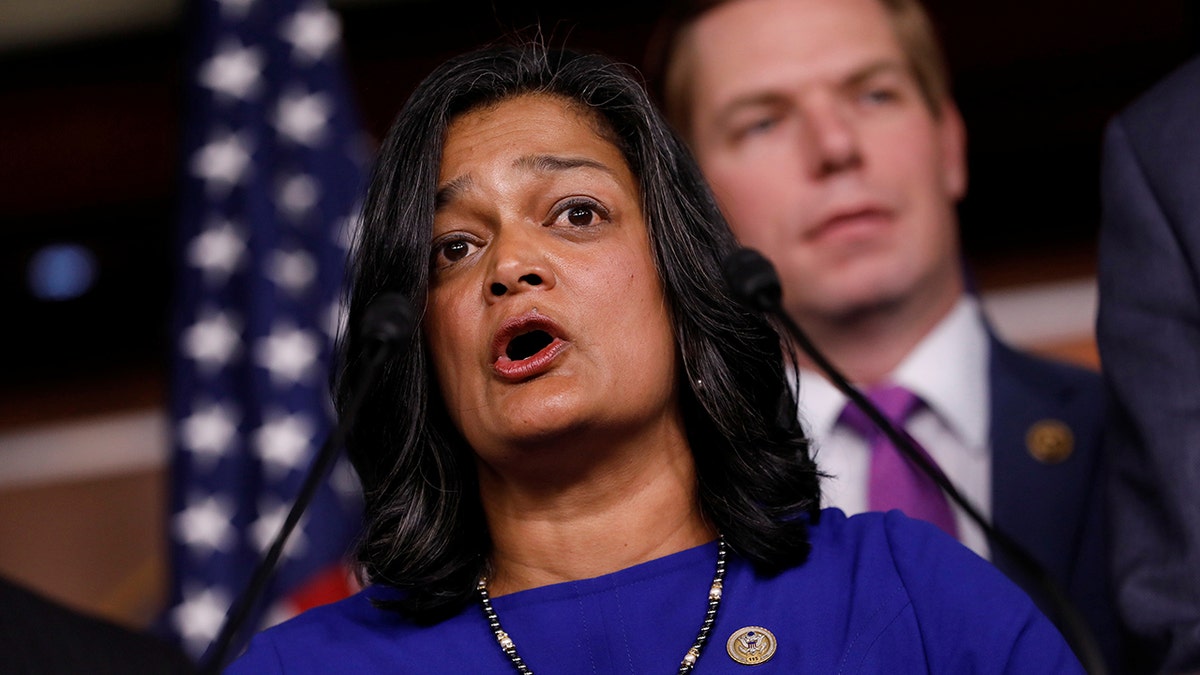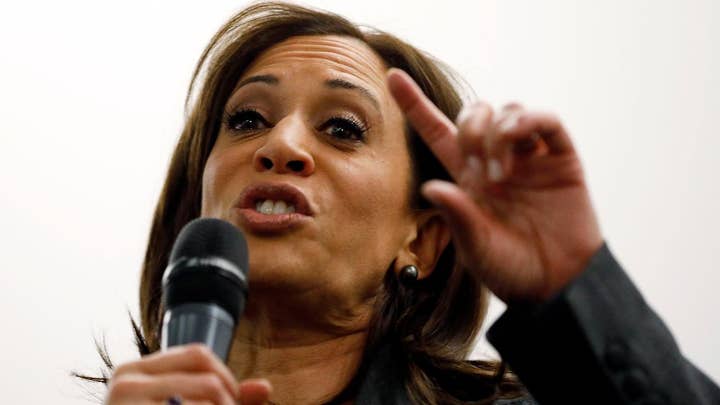Progressive Democrats push 'Medicare for all' platform
Critics say to provide Medicare for all, taxes would have to go up while quality, choice and access to care would go down; chief congressional correspondent Mike Emanuel reports.
House Democrats on Wednesday unveiled their latest “Medicare-for-all” bill -- a sweeping overhaul of the nation’s health care system that would largely outlaw private insurance as part of what critics call a one-size-fits-all government takeover.
The bill was introduced by Reps. Pramila Jayapal, D-Wash., and Debbie Dingell, D-Mich., and is co-sponsored by more than 100 House Democrats including Rep. Alexandria Ocasio-Cortez, D-N.Y., showing the extent to which the policy has drifted from the fringe of the party to the mainstream.
BERNIE SANDERS SAYS 'NO' TO AMERICANS WHO WANT TO KEEP PRIVATE INSURANCE UNDER 'MEDICARE-FOR-ALL'
It would move America to a virtual single-payer system, like systems used in the U.K. and Canada, and promises to “prevent healthcare corporations from overcharging for the costs of their services and profiting off illness and injury.”
“It’s time to put people’s health over profit. Our bill will cover everyone. Not just those who are fortunate enough to have employer-sponsored insurance,” Jayapal said in a statement. “Not just children. Not just seniors. Not just those who are healthy. Everyone. Because healthcare is a human right. We will need every single person in the country to help us, to stand with us, to organize and to fight for this.”
“Everybody in, nobody out,” Jayapal said at a press conference, according to The Guardian, where she hailed the bill as a “complete transformation of our healthcare system.”
The legislation, though, revives a controversy over what such a health care overhaul would mean for private insurance. Under the new proposal, private insurance plans could only be used to supplement coverage that is offered by the government, “for any additional benefits not covered by this Act.”
But the text of the proposal makes clear that private policies would largely be eliminated. One clause in the bill makes it “unlawful” for a private health insurer “to sell health insurance coverage that duplicates the benefits provided under this Act.” The text also prohibits employers from doing the same.
America’s Health Insurance Plans, an advocacy group for the private health insurance industry, said the vast majority of Americans are happy with their coverage as it is.
“Americans want to improve what’s working for them and fix what’s broken. This bill will hurt patients, consumers, and taxpayers: Americans will pay more, to wait longer, for worse care,” spokeswoman Kristine Grow told Fox News in an email. “Let’s focus on real solutions that deliver real results, not a one-size-fits-all government system.”
Republicans immediately painted the plan as “disastrous,” pointing to studies that suggest the price tag could be as high as $32 trillion.

Rep. Pramila Jayapal (D-WA) unveiled her "Medicare-for-all" plan this week. REUTERS/Aaron P. Bernstein
“Medicare for all will eliminate private insurance, make trips to the DMV look like a Caribbean vacation and cost taxpayers trillions. Good luck to the vulnerable House Democrats who will be forced to defend this $32 trillion boondoggle,” National Republican Congressional Committee spokesman Michael McAdams said in a statement.
The legislation was quiet on the question of price. According to Politico, Jayapal said she plans to release a separate list of suggested funding mechanisms -- which include additional taxes or mandated employer contributions.
According to a fact sheet from Dingell’s office, the transition to Medicare-for-all would take two years. The coverage would include all primary care, dental, vision, maternity and newborn care, prescription drugs, mental health services and others. It would also cover "women's reproductive health services." The plan would appear to leave little that could be covered by private insurers.
The move marks a radical shift from former President Barack Obama’s original pitch for ObamaCare -- where he falsely promised: “If you like your plan, you can keep your plan.” That statement was eventually labeled “lie of the year” by Politifact.
House Speaker Nancy Pelosi, D-Calif., has not co-sponsored the bill, but has indicated she would allow hearings on the bill in an apparent nod to the party's left flank. The legislation would almost certainly be dead on arrival in the Republican-controlled Senate.
But the legislation appears to mark part of a broader shift by Democrats, with a number of 2020 presidential hopefuls coming out in favor of Medicare-for-all plans, and some putting their support behind abolishing private health plans.
Sen. Kamala Harris, D-Calif., was asked by CNN host Jake Tapper in January if people could keep their current health care plan under her Medicare-for-all plan. She indicated that they couldn't, suggesting she wants to move toward a single-payer system rather than a mere expansion of Medicare.
"Well, listen, the idea is that everyone gets access to medical care. And you don't have to go through the process of going through an insurance company, having them give you approval, going through the paperwork, all of the delay that may require," Harris told Tapper.
"Who among us has not had that situation?" she continued. "Where you got to wait for approval, and the doctor says, 'Well I don't know if your insurance company is going to cover this.' Let's eliminate all of that. Let's move on."
On Monday, fellow 2020 hopeful Sen. Bernie Sanders, I-Vt., was asked on CNN if, under his plan, people could keep their private plans.
“No,” Sanders responded mid-question as he shook his head. “What will change in their plans is the color of their card. So, instead of having a Blue Cross/Blue Shield card, instead of having a United Health Insurance card, they're gonna have a Medicare card.”
Fox News' Joseph Wulfsohn contributed to this report.














































